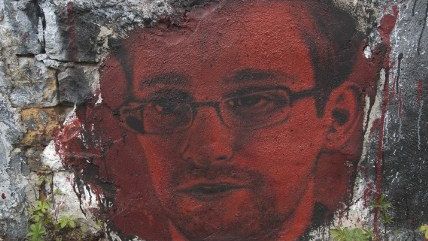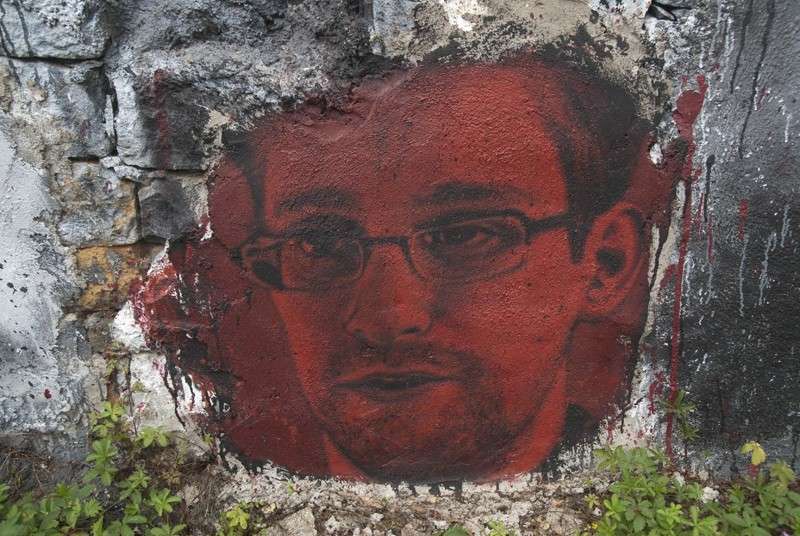And Now It's Time for the Ritual Blaming of Edward Snowden for Terrorism
Here's why CIA Chief John Brennan is full of crap.


CIA Director John Brennan clearly wants Americans (and the rest of the world) to believe that because Edward Snowden revealed that the United States was collecting massive amounts of data about its own citizens, the reforms that we have demanded have somehow, in some fashion, contributed to Friday's terrorist attack in Paris. Via Politico:
"In the past several years, because of a number of unauthorized disclosures and a lot of handwringing over the government's role in the effort to try to uncover these terrorists, there have been some policy and legal and other actions that are taken that make our ability collectively, internationally to find these terrorists much more challenging," [Brennan] said. "I do hope that this is going to be a wake-up call particularly in areas of Europe where I think there has been a misrepresentation of what the intelligence security services are doing by some quarters that are designed to undercut those capabilities."
So, two details to point out on this completely predictable response from Brennan:
1. The reforms that reduce the federal government's surveillance authority only apply to Americans within the United States. That is it. There is absolutely nothing in the USA Freedom Act passed earlier in the year that would have hampered the CIA or National Security Agency (NSA) from attempting to track any of these terrorists. (Also, it hasn't even been implemented yet.)
2. In July, France decided to expand its government's surveillance authority in its own version of a Patriot ACT. While it doesn't permit bulk metadata collection, it does create a new body to provide secret approvals for surveillance without requiring warrants.
Then there's also the argument that terrorists are shifting platforms and using tougher encryption because Snowden revealed where surveillance was happening. London Mayor Boris Johnson wrote in the wake of the Paris attack that Snowden's whistle-blowing has "taught some of the nastiest people how avoid being caught."
That claim ignores the oft-repeated (but not to be dismissed) realization that the mass metadata collection the NSA engaged in failed to stop a single terrorist plot. It's not the tools that are the problem, nor is the problem the lack of surveillance authority. Rather, whenever we delve closely into the question "How did they get away with this?" what we often find is a failure of these authorities to adequately communicate with each other. The right information didn't get into the right hands.
Will that be the case here? Well, the alleged mastermind of the Paris attacks was not some unknown, but rather a guy by the name of Abdelhamid Abaaoud, an established terrorist at large who has actually already been sentenced to prison (in absentia) in Belgium for recruiting terrorists. He was even given a glowing profile in the Islamic State's Dabiq magazine (pdf). He was most assuredly on every foreign intelligence agency's radar and whatever intelligence failures regarding his plotting cannot be pinned on the ending of mass metadata surveillance of Americans, for heaven's sake.
In the event the mass surveillance argument doesn't work, authorities then turn to blaming encryption. An official in Belgium says terrorists are coordinating their attacks via conversations on Playstation 4, which is difficult for them to monitor. There's a push from government officials in the United States, United Kingdom, and elsewhere to try to force communication tools, however they manifest, to have encryption "backdoors" so that government can access them at any time.
This is a terrible idea entirely because of the massive potential for abuse. A tool a government official can use to force access into data can be used by anybody else who figures it out. Encryption doesn't just decrease individual privacy; it decreases security, opening us all up to greater potential for identity theft and other terrible consequences by bad actors. And as Jacob Sullum has previously noted, some of those bad actors may themselves be government officials. They don't even need to be officials looking to snoop and punish people for their opinions. Keep in mind all those cases of identity theft tied back to DMV employees or IRS workers.
Glenn Greenwald, a top Snowden defender, obviously, given Greenwald's role in reporting Snowden's leaks, responded in his fashion about how blaming terrorism on Snowden and encryption is simply absurd:
One key premise here seems to be that prior to the Snowden reporting, The Terrorists helpfully and stupidly used telephones and unencrypted emails to plot, so Western governments were able to track their plotting and disrupt at least large-scale attacks. That would come as a massive surprise to the victims of the attacks of 2002 in Bali, 2004 in Madrid, 2005 in London, 2008 in Mumbai, and April 2013 at the Boston Marathon. How did the multiple perpetrators of those well-coordinated attacks — all of which were carried out prior to Snowden's June 2013 revelations — hide their communications from detection?
This is a glaring case where propagandists can't keep their stories straight. The implicit premise of this accusation is that The Terrorists didn't know to avoid telephones or how to use effective encryption until Snowden came along and told them. Yet we've been warned for years and years before Snowden that The Terrorists are so diabolical and sophisticated that they engage in all sorts of complex techniques to evade electronic surveillance.
By itself, the glorious mythology of How the U.S. Tracked Osama bin Laden should make anyone embarrassed to make these claims. After all, the central premise of that storyline is that bin Laden only used trusted couriers to communicate because al Qaeda knew for decades to avoid electronic means of communication because the U.S. and others could spy on those communications. Remember all that? Zero Dark Thirty and the "harsh but effective" interrogation of bin Laden's "official messenger"?
Greenwald figures the Snowden blame to be a whole lot of ass-covering for a lot of Western foreign policy failures.
Other reports, as information about the suspects starts to dribble out, show the possibility of yet even more problems with intelligence sharing between countries. The latest, this morning, is that Turkey apparently may have tried to warn France about one of the men over the summer, but apparently never heard back from French officials … until after the attack on Paris.
Why should anybody accept arguments from the likes of Brennan that they must have unfettered access to so much data when we see such poor handling of information that actually matters?


Show Comments (77)